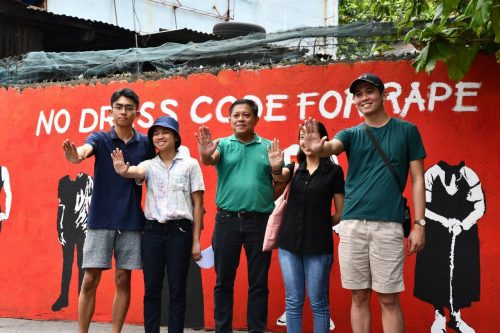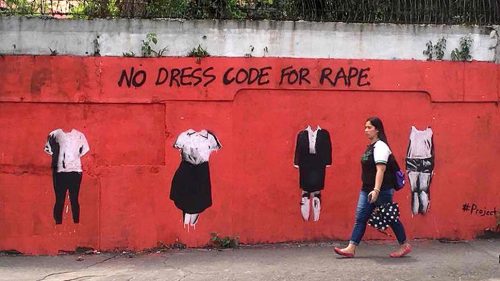
Graffiti artists and Metro Manila student councils on Sunday unveiled a mural with the ‘No dress code for rape’ call as a stand against forms of sexual harassment in the streets.
“This artwork is our way of taking back the streets. Every street or alley should be spaces free from sexual harassment,” Imi Espina of Akbayan Youth said. Produced by graffiti artists led by Bacolod-based artist Gila Inefable, the mural is located along one of the jeepney terminals in Quiapo and near Manila’s university belt.
Espina also called for the passage of the Bawal Bastos Bill or the Safe Streets, Public Spaces and Workplace Act into law which penalizes catcalling, wolf-whistling, leering, stalking, and other forms of sexual harassment that take place in public spaces. “Ensuring that cities are safe spaces shouldn’t be optional,” Espina added.
Up to 140 cases of sexual harassment a day in Manila alone
Amena Natangcop, student council president of Philippine Women’s University, said that up to 140 Filipinos experience sexual harassment every day in the city of Manila alone, extrapolating data from the Manila Police Department, UN Women and the Social Weather Stations.
“Sexual harassment happens in the streets of Manila every day. This mural is our way of not staying silent in the face of these alarming data. We want to engage and remind the community of its responsibility in keeping the streets and public spaces safe for all,” she added.
Natangcop also said that 9 in 10 cases of sexual harassment do not get reported to authorities. “Victim-blaming prevents women from reporting cases of sexual harassment. They get intimidated. ‘Bakit kasi ganyan ang suot mo?’ is the most common way of telling victims that it’s their fault. That is wrong,” she remarked.

Bill to lapse into law April 21
The Bawal Bastos Bill is expected to lapse into law on April 21 of this year.
“We are expecting the Bawal Bastos Bill to lapse into law on April 21 or sooner if the President chooses to sign it”, said Akbayan Partylist Representativ Tom Villarin, principal author in the House of Representatives.
Villarin also said that the bill, once enacted int law, overhauls the country’s outdated anti-sexual harassment law. ““It is a 24-year-old law that needs urgent updating – loopholes include only penalizing sexual harassment in the workplace and only when it happens from superior to subordinate”, he explained.
“The Bawal Bastos Bill covers peer-to-peer and subordinate to superior sexual harassment in the workplace. The law will also cover gender-based electronic violence, strengthening our Anti-Cybercrime Law, and sexual harassment that happens between strangers: in the streets, in public utility vehicles, in clubs, bars and restaurants,” Villarin furthered.

Anti-sexual harassment policy in schools
Student council also welcomed the bills provision of mandating schools with an anti-sexual harassment policy. “Schools will have to craft and implement a strong anti-sexual harassment policy to protect their students,” Natangcop said. “Schools are our second home. School administrators need to ensure that these are safe spaces for students and for al,l” she added.
According to Villarin, “schools that fail to do so or act upon cases of sexual harassment that happens within their vicinity can face sanctions or eventually have their licenses revoked”.
The mural unveiling was attended by advocates, graffiti artists, and student councils from the University of the East, De La Salle University-Manila, Far Eastern University, College of St Benilde, Pamantasang Lungsod ng Maynila, University of Sto Tomas, and Far Eastern University.

